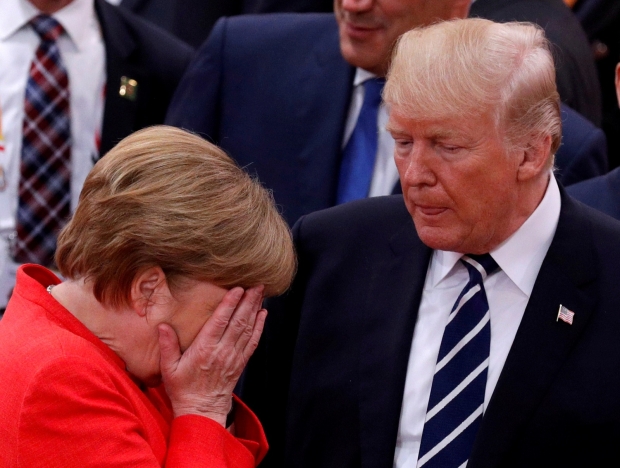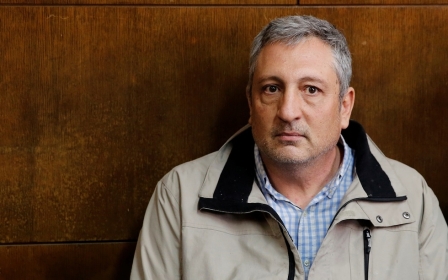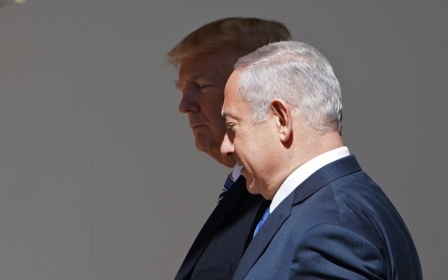ANALYSIS: Iran is the target as Netanyahu heaps praise on Trump
It is not uncommon for Republican officials and lawmakers to take turns singing the praises of Donald Trump, often while the US president is sitting in the same room. The best way to influence Trump is to applaud his work and character, a former US senator told CNN last year.
And it seems that Israeli Prime Minister Benjamin Netanyahu was listening.
The embattled Israeli leader showered Trump with compliments ahead of a bilateral meeting in Washington on Monday, comparing the US president to Cyrus the Great, a Persian king who is said to have freed Jews exiled in Babylonia and allowed them to return to Jerusalem some 2500 years ago.
The best way - for thousands of years - for leaders to change any conversation is through violence and war.
- Mark Andrew Le Vine, professor
Trump recognised Jerusalem as Israel's capital late last year, and a new US embassy is set to open in the holy city in May.
"Mr President, this will be remembered by our people throughout the ages," Netanyahu said of the embassy move. "And as you just said, others talked about it. You did it. So I want to thank you on behalf of the people of Israel."
He then went on to say that the biggest threat to the Middle East can be "encapsulated in one word: Iran."
The National Iranian American Council, a Washington-based advocacy group, denounced Netanyahu for likening Trump to Cyrus the Great.
"Comparing Donald Trump - the man who has banned Iranians from the United States - to Cyrus the Great is as laughable as it is insulting," the group said in a statement.
"Even worse - Netanyahu and Trump are working together to try to kill the Iran nuclear deal and set the stage for war with Iran. And later this month, Saudi Arabia's Crown Prince Mohammad Bin Salman will be in Washington for the exact same purpose."
'Ludicrous'
King Cyrus is a central figure in both Persian and Jewish history.
Mark Andrew Le Vine, a Middle East history professor at the University of California Irvine, called the comparison "ludicrous," saying that "it really doesn't make any historical sense."
But it may be about giving Israel sovereignty over Jerusalem and the occupied West Bank, the professor added.
"Beyond that, it's just stroking Trump's enormous ego about being someone of world historical importance," Le Vine told Middle East Eye.
The Arabs have never been closer to Israel.
- Benjamin Netanyahu
Trump decertified the Iran nuclear deal last year, but fell short of pulling the US out of the pact, leaving it up to Congress to re-impose sanctions on Tehran.
Netanyahu's expression of gratitude for Trump on Monday preceded a verbal attack on Tehran, where the Israeli leader criticised the Iran nuclear deal and touted a possible alliance between Israel and its "Arab neighbours".
"The Arabs have never been closer to Israel," Netanyahu said, adding that the greatest challenge for both Israel and its potential Arab partners is Iran.
The treaty between Iran, the US, France, UK, Germany, Russia and China drastically scales back the Islamic Republic's nuclear programme in exchange for lifting economic sanctions on Tehran.
Netanyahu has not been a fan of the accord, either. In 2015, he delivered a speech in Congress to make a case against then-president Barack Obama's policies towards Iran.
"Iran has not given up its nuclear ambitions. It came out of this nuclear deal emboldened, enriched," Netanyahu said at a joint news conference with Trump on Monday.
James Zogby, president of the Arab American Institute, voiced concern over the US position in the world if Trump, whom he said is capable of "many dangerous pronouncements", pulls Washington out of the Iran deal without consulting with other signatories to the agreement.
"If the US wants to further isolate itself from its European allies and from Russia and China, then it will pursue a unilateral policy," Zogby told MEE. "The danger is not just what it represents for Iran and Israel. It's a danger for the US and the world. It isolates us if we walk away from this without the support of our European allies."
He called Netanyahu's praise for Trump "dangerous".
While Trump's top aides have warned against nixing the agreement, Le Vine noted the unpredictability of the US president to highlight that the deal is not safe.
Trump is facing increasing domestic pressure from the investigation of possible collusion between his campaign and Russia. His Israeli counterpart is also enduring a political crisis at home, including several corruption probes.
"They are clearly desperate to change the conversation," Le Vine said of Trump and Netanyahu. "The best way - for thousands of years - for leaders to change any conversation is through violence and war. You have two men who both have a vested interest in creating a situation that is so grave that people cannot talk about the problems they're experiencing."
An Arab-Israel alliance?
As for Arab-Israeli rapprochement, Le Vine said it is old news.
He said Riyadh does not see Israel as a threat and is mainly concerned with Iran, adding that the 2003 US invasion of Iraq which toppled Saddam Hussein left no Arab leaders outside the US orbit.
"Peace between the Arab countries and Israel is in the past tense; it happened a long time ago… What you're talking about now is solidifying military, strategic and economic relations at the highest possible level," Le Vine said.
As much as the Gulf states hate Iran, it does not translate into love of Israel.
- James Zogby, AAI
But Zogby had a different outlook. He cited a 2017 AAI poll, which showed that only 2 percent of Saudis and 1 percent of Emirates favour an anti-Iran alliance with Israel if Palestinian rights are not addressed.
"As much as the Gulf states hate Iran, it does not translate into love of Israel," he said. "This is barking up the wrong tree and will not go anywhere. No Arab state will make peace or deal overtly with Israel as long as the Palestinian issue is not solved."
He said Arab countries know that partnering with Israel against Tehran is "dangerous" because they are aware of where their public stands on the issue.
"There maybe backdoor channels. But backdoor channels do not translate into an open, public alliance. Nothing overt will happen until peace is made," Zogby told MEE.
Trump has proved to be a decisive figure in US politics. And scepticism of Israel is growing in Democratic circles.
Would the picture of Netanyahu showering Trump with praise hurt Israel's image in US liberal circles?
Le Vine said folks who like Netanyahu in the global political landscape are likely Trump fans as well.
"They're like the peanut butter and jelly of right-wing politics," the professor said.
New MEE newsletter: Jerusalem Dispatch
Sign up to get the latest insights and analysis on Israel-Palestine, alongside Turkey Unpacked and other MEE newsletters
Middle East Eye delivers independent and unrivalled coverage and analysis of the Middle East, North Africa and beyond. To learn more about republishing this content and the associated fees, please fill out this form. More about MEE can be found here.





